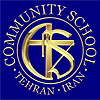 |
Community School
1935 - 1980 Tehran, Iran _______________________________ |
|
Home News Reunions Library Community Directory Missing Links About Us Contact Us |
Taught to believe in a better world  Former students of Tehran Community School share laughs before the reunion in Montreal From left, Sandra Koukou, Vicky Shemie, Loretta Gabbay, Barbara Alexander, Katia Dallalpour, Victor Dabby (standing), Shaul Ezer.
They're flying in from around the world for a school reunion
with a difference. |